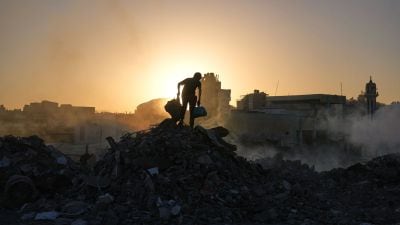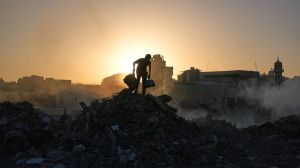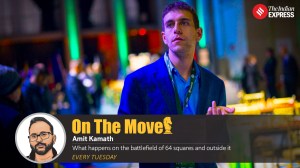In 1994, under a Congress government, then Leader of the Opposition Atal Bihari Vajpayee led an official delegation to Geneva and successfully blocked Pakistan’s attempts to get a UNHCR resolution passed censuring India on the Kashmir issue. Upon Vajpayee’s return, a photo of him hugging Salman Khurshid, then the Minister of State, External Affairs, captured the moment of bipartisan unanimity.
Khurshid, who held the portfolio again from October 2012 to May 2014 under the UPA government, and is now a member of the Congress Working Committee, speaks to The Indian Express on the Pahalgam terror attack, Operation Sindoor, the ceasefire, and the role the Opposition has to play. Excerpts:

* What do you make of the ceasefire declared by India and Pakistan on Saturday evening, and the announcement by US President Donald Trump regarding this?
… Obviously it (America) has something to do with it, also direct conversation between the DGMOs (Director Generals of Military Operations of India and Pakistan)… One doesn’t know the background completely, but it seems like a satisfactory position that the Indian military and government have found… Let us wait and see… (But) It’s a good thing that the killing of innocent people, particularly through shelling… that will come to an end…
Story continues below this ad
The situation in the world… clearly shows the role that America is playing, or wants to play. If it works to our benefit, then no harm in taking advantage of it. But as I said, there is only a brief statement (made so far)… what goes into it etcetera, we need to know.
* Top government sources said Saturday that any future terror act will be considered an ‘act of war’.
The Indian government’s consistent position has been – I can’t be sure how much of this has been considered as part of the ceasefire agreement – but this is a consistent position of the government of India.
* According to you, what should be the future course of action from the two sides?
Well, there is only one simple thing that Pakistan has to do – to give up supporting terrorism. That’s a simple thing that they have to do, everything else will follow. That’s a precondition – whether you say it or not, that is a precondition. That has to stop.
… We maintained clearly that they escalated, we responded.
* After the Pahalgam terror attack of April 22, the government took a series of steps, starting with diplomatic and economic measures, followed by Operation Sindoor.
Frankly, the Indian side was not left with much choice. It was an extremely short-sighted, cynical thing that the terrorists tried to inflict. There is no clarity about what they may have hoped to achieve. I think they could have achieved nothing at all except, going by their conduct and behaviour, trying to push a divide between the communities. But that is not something they can succeed in, and I am really grateful to the families of the victims who themselves said this should not divide the communities.
Story continues below this ad
I don’t think the government had a choice but to react. And the government, having reacted in a careful and calibrated manner, can be appreciated. Somebody thought it should have been done differently, they can have a point of view. (But) People (should) not expect that they could get away with what they did. They had to be given a response and punished. That is very clear.
But… issues such as deterrence and final solution are not issues that can be resolved in a day, week or month… We have said we support the government and the Armed Forces, but if we are required to do anything more, we will be happy to extend further cooperation.
* India hit terrorist bases in nine locations, including of the Jaish-e-Mohammed and Lashkar-e-Taiba …
One can’t think of anything better that could have been done. Whatever the tactical and strategic elements were, the decision and planning were very clear. There isn’t anything that could have been done better… I think we would have appeared to the world as not having done anything that could be considered escalatory…
We have been able to ensure that we have that technology that we can hit in a manner of precision… It is a commendable thing… The Armed Forces deserve our congratulations.
Story continues below this ad
* What are your views on how Pakistan responded? Civilians were killed because of its indiscriminate shelling.
See, there is a word for the Pahalgam attack and that is cowardly. And the shelling that happened on the border was very cowardly. Because innocent civilians are the victims of both. So, they must judge in terms of ethics, morality … clearly, they are offensive… We called a spade a spade: terrorism. And we made it very clear who is responsible for it. I don’t think a convincing argument came from the other side.
* Both China and the US urged India and Pakistan to find an end to the conflict.
Some posturing is done for public consumption and some for well-thought-out decisions. It is important that the primacy, the posture, and the position of India are that we are not treated as children who have to be chided and that, for us, it is a very important moral fight for our sovereignty in every possible way.
* What about the government’s diplomatic efforts?
They made good efforts. But I believe diplomatic efforts are never enough. During critical moments in the past, we took the help of the Opposition parties. Particularly those who have the experience of ruling… We are willing to help…
* Was the Congress’s response this time different compared to earlier incidents of terror?
Our response was not different. What happens is that there is not just a diktat that everyone follows when something like this happens. There are people who use their minds and express their emotional and sentimental reactions. What is important is that we were a little more careful this time that there should not be conflicting opinions, even shades of opinion that will be seen as differences. We tried to concentrate and ensure that a very precise response was given, particularly that it came from our leadership and resonated…
Story continues below this ad
There are always questions you can raise. But the experience of what happened in the past and what is happening now is all factored in, and then you take a position. It was very important this time to nip the mischief in the bud. That was very clearly obvious when the attacks happened in Pahalgam, that these attacks were not just expecting collateral but were being directed at creating community differences. And therefore, it was important and a greater responsibility on us that it didn’t happen.

































